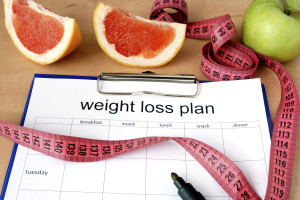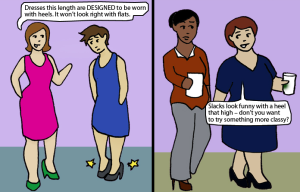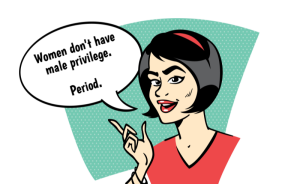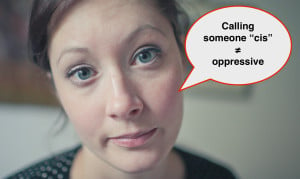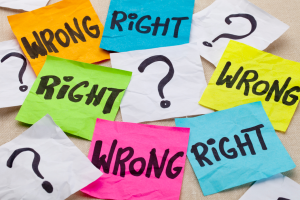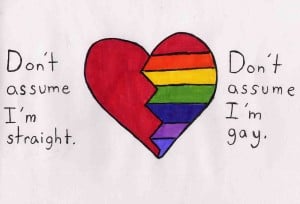It’s easy to succumb to diet culture.
It’s easy because it’s all around us. It’s the default setting. The acceptable way to behave. The cornerstone of not only our major media, but also our healthcare system, our entrepreneurial spirit, and our cultural ethics.
Dieting – whether a fad diet, a “detox,” or a “lifestyle” – is not just a verb; it’s an entire belief system. And no matter how abusive diet culture is to our bodies or our minds, we, for some reason, continue to choose to cling to it.
To quickly define my terms, when I speak of diet culture, I’ll quote socialjusticeleague.net:
[It’s] a system of thought in which food is an issue of public morality…[where] bodies are rated as healthy or unhealthy based on their degree of ‘fatness,’ and health becomes a saintly attribute, while ill health becomes a serious personal failing.
In addition to moralizing the fat body, diet culture is also deeply tied to capitalism and is perpetuated by those with vested interests in continually and cyclically providing people with the tools to get thin (even though those tools rarely work in the long term or require long-term investments in order to upkeep the thinness).
As a person who has recovered from an eating disorder and who works, speaks, and lives with others who are at various stages of recovery or non-recovery from either their own eating disorders (the mental illnesses) or chronic dieting (the disordered habit), I’m acutely aware of the dangers of diet culture.
As a person who exists in the intersectional body positive space and sees – daily! – examples of bodies of all shapes, sizes, colors, genders, and abilities and the happy, functional people living within those bodies while fighting the stigmas of diet culture, I’m also acutely aware that it’s possible to exist without the influence of diet culture.
And yet, when I bring up the subject to people who are still actively subscribed to the mentality, I’m met with such loathing, hatred, and vitriol that I’ve lost friends and acquaintances and dealt with my fair share of trolling just for making the suggestion that maybe – just maybe – we don’t need to diet anymore.
I’m not even talking about “fad diets” like grapefruit diets or cabbage soup diets or the Master Cleanse. I’m talking about “lifestyle” diets, which include the cyclical dieting and over-exercise promoted by multilevel marketing companies (think Beachbody, Isagenix, Advocare) and our ever-ubiquitous cults of “clean eating.”
People are attached to their rules and their outcomes, their programs and their restrictions, their weight loss at all costs – and often at high cost to their mental, emotional, and physical health, not to mention their wallets.
Why are we so attached to our diets?
Why are we so unwilling to unsubscribe from the idea that diet culture is dangerous and unproductive? And so absolutely eager to hand over our paychecks and our empowerment to any company with enough sense to slap the words “healthy” or “weight loss” on the package?
And, most importantly, why are we so willing to defend and perpetuate the physical, emotional, and monetary abuse diet culture presents to us, even in the face of facts that prove diet culture is based on faulty thinking?
The issue, I believe, isn’t about a lack of information, but about how misinformation is strengthened into a belief system.
Because if you want information about how and why diet culture – and dieting in general – is dangerous and a waste of time and money, then look no further than pretty much every body-positive and intersectional feminist resource on the Internet.
The information is there if you want it – and even if you don’t.
The issue is misinformation.
Because for every body positive, Health at Every Size article written about why you don’t have to be thin to be healthy, there are about 800 million blog posts, news reports, magazine ads, and Beachbody coaches who will tell you that becoming and staying thin is the only way to prove you’re healthy.
So the misinformation is there – everywhere, in fact. But the real information is there too. The problem is that the cost of disbelieving that information is high.
1. Capitalism Raises the Costs of Disbelieving in Diet Culture
Why is it so costly not to believe in diet culture?
Well, if it weren’t profitable in some way to believe in diet culture, then no one would cling so dearly to it; however, that’s not the case – because it can be extremely profitable to believe in and perpetuate diet culture.
Think about it:
You can become a work-from-home health coach, and make recurring money by “inspiring” people to “be their best selves” – only to have them come back to you (for more money) when it doesn’t last long-term.
You can make money as a network marketer selling cleanses and detoxes and supplements to people on a recurring basis, again because these products don’t work long-term or they require customers to keep using them long-term in order to work.
You can make money as a personal trainer or fitness coach, “inspiring” people to subscribe to that #gymlife, and focus on continually trying to perfect the not-perfectible thing that is the human body.
You can make money as a clean eating or healthy living blogger through affiliate sales of protein bars and yoga clothes – or by writing a best-selling cookbook.
Need I go on?
And if you don’t choose to actively capitalize on diet culture, you can still gain social and monetary capital by going on diets or suppressing your weight.
If you’ve ever commented positively on, or gotten a positive comment on, a social media “before and after” post, you’re part of that exchange of social capital.
Thin privilege – often the result of a subscription to weight suppression tactics – affords the holder of that privilege many advantages. (So as not to rehash the argument, you can see several examples here.)
I personally subscribed to diet culture for a long, long time because it gave me many advantages:
I was seen as sexually viable (even though chronic dieting and over-exercise killed my sex drive, and I was so focused on timing my meals and getting to the gym that I wasn’t able to date).
I was trusted by complete strangers to give health advice, which made me feel like I was providing valuable health information and saving lives (even though I wasn’t getting my period and my own body was shutting down).
I was accepted as a part of a community that felt elite because it was dedicated to health (even though sitting around and rehashing our nutrition philosophy all day was an empty connection and a waste of precious time).
I was able to fit into clothing in every store at which I shopped without having to find specialty stores or pay extra for extended sizes (even though I was trying to make my body fit the clothing instead of finding clothing that fit my body).
I was never discriminated against in a job interview, on a first date, at the grocery store (even though I was busy discriminating against and judging anyone I deemed as too fat to be good at a job, worth dating, or purchasing that much or those types of food at the grocery store).
Because my appearance was in line with diet culture’s mandates about acceptability and aesthetics, I had the ability to capitalize on my thin privilege, both monetarily and socially.
And I had no reason to let go of my beliefs about diet culture because it did not pay to let go of those beliefs.
So I can understand why it’s so hard for chronic dieters and weight suppressors who are “success stories” don’t want to stop dieting. The price is high.
But what about people who don’t have thin privilege? Why are they willing to believe in, uphold, and buy into diet culture even though it discriminates against and marginalizes them? What about “self-hating” people who defend fat shamers and agree that they, themselves, nee to beat themselves up for being fat?
Well…
2. Most People Aren’t Willing to Give Up Faulty Beliefs If It Costs Them To Do So
There is no way (or very few ways) to capitalize – monetarily or socially – on body positivity and health at every size as culture currently stands. At least, that’s how I see it.
People are willing to believe in the things that hurt them when they stand, potentially, to gain from those beliefs. People are willing to buy and sell the things that hurt them when they stand, potentially, to gain from those beliefs. Especially when there are few people who are actually proving that you can gain from letting go of those beliefs.
One of the things that makes me sick to my stomach – and one of the reasons why I’m letting go of the title “health coach,” because I don’t want to be associated with this nonsense – is seeing people who claim to be body positive and then use weight loss and dieting as a motivator anyway.
People who claim to be body positive but then do an interview as a part of a weight loss summit or write a book about how to “safely” lose weight “the right way” or use weight loss as a motivator to gain clients for their nutrition or fitness coaching or customers for their network marketing product. People who are co-opting body positivity while capitalizing on deeply entrenched diet culture beliefs.
But I’ve had to learn the hard way that you don’t make money when you tell people they don’t have to lose weight.
Being an activist and sticking to your morals is hard, because there isn’t a lot of compensation – monetarily or socially – for bucking the system.
One of the reasons why network marketing works is because you gain sellers underneath you by proving that you yourself can make money doing what you do. If I can’t prove that not being super lean and obsessed with taking pictures of my smoothies pays, then why would anyone want to subscribe to my worldview?
The same goes for everyday people who don’t call themselves activists or coaches.
If you choose not to engage in diet culture, you lose social capital. If you’re not one of the “good fatties” who is constantly trying to prove that you’re working on not being fat, then you’re more likely to be labeled as lazy, ignorant, unhealthy, and untrustworthy. Which makes it harder to get a job (or get compensated fairly for that job). To be considered worthy of a date. To go through life unscrutinized every time you make a choice about what to eat.
So we hold onto our beliefs even in the face of new information, because that information threatens the things that bring us capital.
And we take one more bite of our dry chicken breast and steamed veggies and one more swig of our protein shake, and wait for the day when our hunger for more will be truly fulfilled.
3. The ‘Backfire Effect’ Keeps You from Accepting New Information About Diet Culture as True
Now, obviously, most people are not willing to admit that their capitalistic interests are the drivers of their commitment to their diet dogma, let alone even have any idea that those drivers even exist or that their diet could be abusive to their physical and emotional health in any way.
But once educated about these things, why do people cling so hard to their dogma instead of seeking positive solutions – and why do they keep paying (sometimes more!) to diet?
Recently I stumbled across a study that was done several years ago at Dartmouth, in which, over a series of experiments, people who were presented with facts that challenged their beliefs actually clung harder to their beliefs, even if those beliefs were built on misinformation.
The study at Dartmouth concerned political beliefs, but I believe that it explains our behaviors in defending our beliefs about our bodies, too:
Participants were given a piece of misinformation through a mock news story. Once they had internalized those beliefs as true, the researchers gave a correction to the misinformation and measured the reactions of the participants.
For the most part, people clung to their misinformation as truth, because it was already a part of their belief system. To admit that it was wrong was to admit that they were wrong.
And when no one wants to be wrong, how do they ever break free from diet culture?
4. The Shame Cycle Is Keeping You from Changing Your Beliefs About Diet Culture
Here’s the most interesting part of the study, and the part that I believe is exactly what keeps us trapped in diet culture:
During one of the experiments, the researchers had participants do a “self-affirmation exercise” before considering new information.
When peoples’ self-esteem was up, they were more likely to consider new information and question their old beliefs.
As one news source reporting on the study pointed out, “This would also explain why demagogues benefit from keeping people agitated. The more threatened people feel, the less likely they are to listen to dissenting opinions, and the more easily controlled they are.”
So if we have self-esteem, we’re less likely to cling to our diets, but:
The main principle behind diet culture is feeling so ashamed of your body that you want to change it.
Diet culture creates low-self-esteem and “agitation” about your body. And when you feel bad about yourself, at least according to this study, you’re less likely to consider that your current beliefs could be wrong.
So diet culture leads to shame, and shame keeps the door open for more diet culture (and, of course, more shame).
Diet culture has, built into itself, a way of perpetuating itself.
And, as we saw before, diet culture also provides you with financial and social incentive not to question things and to keep feeling just bad enough about yourself to keep buying in – emotionally, physically, and monetarily.
When you’re being psychologically manipulated to hold onto your beliefs and rewarded for doing so, of course you’re not going to be willing to let go!
How to Break Free from Diet Culture
So how do you break free from diet culture? The first step, I believe, is surrounding yourself with body positivity – the real body positivity, not the kind that has been co-opted by people who want you to buy their smoothie cookbook or their weight loss coaching program.
The kind where you surround yourself with fierce, unapologetic people of every size, shape, color, and gender who embrace their bodies and invest in their self-esteem instead of their next cleanse or bodybuilding competition.
It took me a long time to develop the self-esteem that would allow me to let go of my damaging and limiting beliefs about my body and to stop investing fully or even partially in diet culture.
I had to go on a journey to developing self-esteem so that I could figure out that my body is just as valid at my un-weight-suppressed size and shape as it was when I was restricting my food and calling it a lifestyle.
But once I recognized that I had value as a person and not as a body, it was easy to quickly let go of the world that I once knew, actively subscribed to, and defended with my life.
If you want to start working on developing that self-esteem, internalizing new information, and stop defending diet culture, there are so, so many resources out there. A few good ones to get started are Health at Every Size, Things No One Will Tell Fat Girls, Body of Truth, Dear Virgie, The Body is Not an Apology, and PlusLife TV (coming soon!).
And of course, Everyday Feminism!
And please, seek intersectional resources. Look for people of every size, shape, color, and gender. Don’t get caught up in looking at one specific type of body. I learned this on my journey: it keeps you trapped in your thinking and often in your own privilege. And every day, I am working on expanding that worldview and allowing other voices to inform me (instead of trying to do what diet culture does and inform everyone else).
I hope that someday we can all get to a place where we feel good enough about ourselves to change the system and remove the award for paying into diet culture.
But until then, will you have the courage to help lead that movement?
I hope so. You’re worth it.
[do_widget id=’text-101′]
Kaila Prins is a Contributing Writer for Everyday Feminism and a health coach who works with women who are ready to stop “recovering” from disordered eating and start “discovering” their true identities. Kaila’s health coaching services, as well as her blog, can be found at Performing Woman, and she hosts a weekly podcast called Finding Our Hunger. She also counts characters and not calories on Twitter @performingwoman.
Search our 3000+ articles!
Read our articles about:
Our online racial justice training
Used by hundreds of universities, non-profits, and businesses.
Click to learn more


